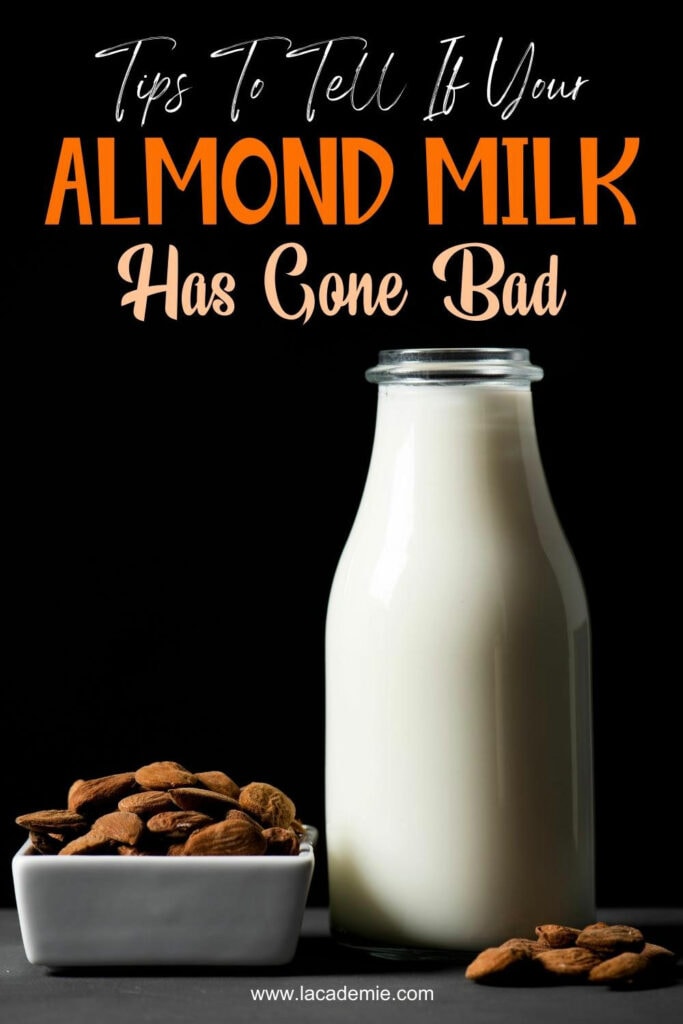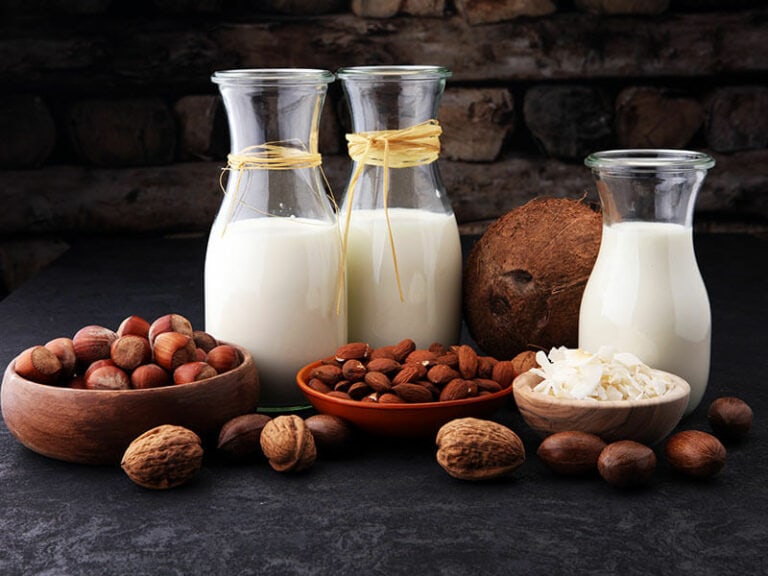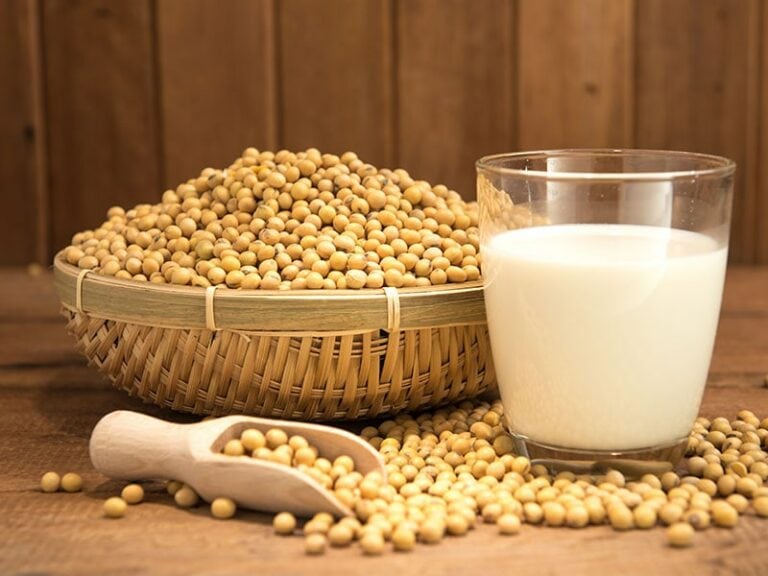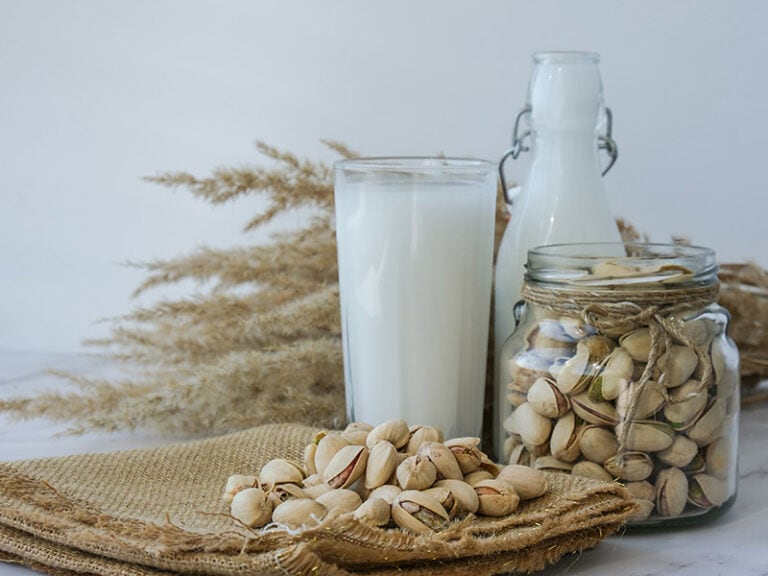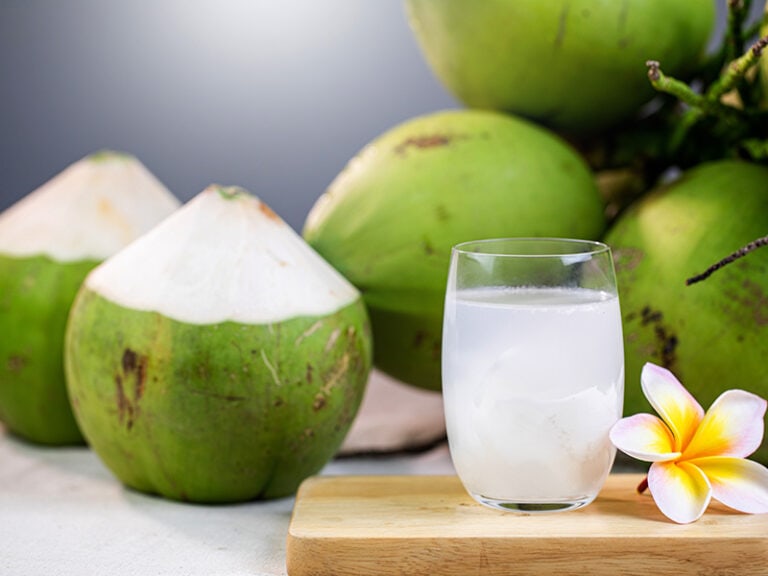“Does almond milk go bad,” you find yourself wondering as you stare at the half-open carton of almond milk, which has been sitting around for a few days. You take a sniff at the drink “But how do I know if my almond milk has been spoiled? Is there any way to store almond milk for longer?”
In this article, I will answer all the questions above for you in the most detailed manner. So, buckle up and let’s get on with this post.
What Is Almond Milk?
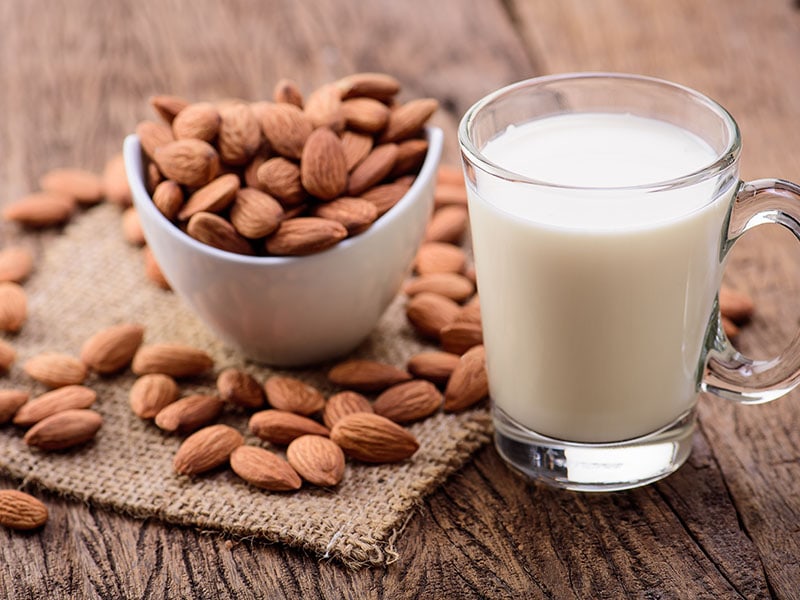
Almond milk is a desired milk variety that is made from, you guessed it, almonds. This non-dairy milk has a nutty flavor, along with a creamy texture. Unlike its dairy counterpart, almond milk does not contain lactose, saturated fat, and cholesterol.
You may think that almond milk has only been around for a few years. However, this drink was invented as far back as the 12th century. Shocking, right? Back in the 12th and 13 centuries , almond milk was consumed by Islamics and Christians during fasting seasons.
Now, almond milk is widely recognized as a healthy alternative to cow’s milk. It has been gaining more and more popularity since 2011, and I can imagine that it will continue to do so in the future.
Nutritional Values Of Almond Milk
Maybe you’re still reluctant to try almond milk. What if it’s not as nutritious as regular cow’s milk? What if it is not as healthy as many people claim it to be? In case those are the reasons why you’re unwilling to give this drink a try, here’s the nutritional values of unsweetened almond milk. (Portion: 100 ml)
As you can see in the table above, with unsweetened almond milk, you can get a high amount of calcium, magnesium, phosphorus, potassium, sodium, Vitamin A, and Vitamin D. Without the presence of saturated fat and trans fat, as well as cholesterol, almond milk is definitely healthy.
What Are The Advantages Of Almond Milk?
How good is almond milk really? Does it really deserve all the hype it’s been receiving these last few years? Why don’t you decide for yourself by reading the benefits of almond milk in the section below?
1. Ideal For Weight Loss

Even sweetened, almond milk is still considerably lower in calories compared to cow’s milk. In fact, cow’s milk can have at least twice as many calories as its non-dairy counterpart. This means that cow’s milk is far more likely to cause weight gain than almond.
Furthermore, almond milk contains only a negligible amount of fat. As is shown in the table above, this non-dairy drink only contains roughly 1% fat. In other words, its fat content is considered to be more or less the same as low fat milk. What fantastic news, right?
However, some manufacturers might add sugars or additional flavorings into the beverage. Therefore, if you’re aiming for weight loss, remember to check the nutrient labels first before purchasing.
If unsweetened products are too plain, there are thousands of ways to make your almond milk suit your palate more, instead of relying on sugar. So, choose wisely for your health.
2. Promote Cardiovascular Health

Because almond milk does not contain cholesterol or saturated fat, it can reduce the risks of high blood pressure as well as heart disease. Without the cholesterol to clog up your arteries, you would be less likely to suffer from strokes.
Moreover, this almond-derived beverage is rich in healthy fats (the type of fats commonly found in fish). So, it can further prevent any potential heart-related problems. These dietary fats can also lower bad cholesterol levels while promoting the increase of good cholesterol.
3. Improve Bone Strength

Almond milk contains a decent amount of calcium, which is necessary for your body to maintain strong bones. With one cup of almond milk, you can absorb up to 30 percent of the recommended daily value.
In children, calcium can promote better bone growth to ensure that they can reach their full potential height. In adults, calcium can prevent low bone mass, which is one of the major causes of osteoporosis (porous bones – a condition where your bones are weak and easy to break).
Almond milk is also rich in vitamin D, which is necessary for preventing diseases such as arthritis and, again, osteoporosis. With the combination of both vitamin D and calcium, you’ll be more likely to have healthy bones and healthy teeth.
4. Maintains Healthy Blood Sugar Level

Unsweetened almond milk is found to contain little to no carbs and sugars, so it will not leave any drastic impact on your blood sugar level. This means that people with diabetes or prediabetes can enjoy almond milk without fearing for their health.
Unsweetened almond milk is also ideal for people on a low-carb diet. As it cannot cause a spike in your blood sugar levels, it would be easier to keep them under tight control. As a result, you can lead a far healthier lifestyle with a healthier body.
However, you need to remember that only unsweetened almond milk can do such a thing. If you need to keep your blood sugar level in check, you should only drink the unsweetened variety. Sweetened or flavored almond milk will not have this benefit.
5. Rich In Vitamin D

Aside from promoting stronger bones, vitamin D can also reduce fatigue and improve your muscles. That’s why it is exceptionally important to incorporate this vitamin into your daily meal, and almond milk provides an easy way to do so.
Vitamin D is of significant importance to the elderly. As vitamin D can strengthen the muscles and bones, it can prevent them from falling over, which is a popular problem that might cause disability and even death in older people.
Vitamin D is necessary for a healthier immune system. It’s essential in helping the body fight against inflammation. This is one of the reasons why vitamin D can reduce the risks of developing the flu.
Another benefit of vitamin D is that it can reduce depression. It has been shown that this vitamin can help you regulate your mood better and, therefore, prevent depression. In those with depression, vitamin D can also improve their symptoms and alleviate their mood.
6. Dairy-Free

Because almond milk is a non-dairy product, it does not contain lactose. As a result, it is a fantastic alternative to lactose intolerant people. Say goodbye to bloating and diarrhea, almond milk is here to save the day.
How Long Does Almond Milk Last In A Refrigerator?

There are plenty of factors that might determine the lifespan of almond milk, such as whether you can keep your almond milk in the freezer. So, pardon the lengthy answer and please allow me to explain everything thoroughly.
The average lifespan of homemade almond milk is around 3 to 5 days, given that you properly store the drink in an airtight container. This lifespan might be affected by the quality of the almonds themselves, so it’s best to finish your homemade milk within 3-4 days.
For shelf-stable almond milk, when unopened and stored at room temperature, you can expect the drink to last up to 3 or 4 weeks even after the expiry date. However, you’re not recommended to put this type of almond milk into the fridge as it will expire faster.
Once shelf-stable almond milk is opened, you should put it in the fridge immediately. This should last the beverage for another 7 to 10 days.
With unopened store-bought refrigerated almond milk, the beverage should last from 7 to 10 days past the expiry date. However, once opened, this milk can only last from around 7 to 10 days, so be sure to finish it within 10 days at most.
Some specific brands of almond milk can last for an even longer time when properly refrigerated. Don’t believe me?
Watch this video to know more:
How Long Can Almond Milk Sit Out Refrigerated?
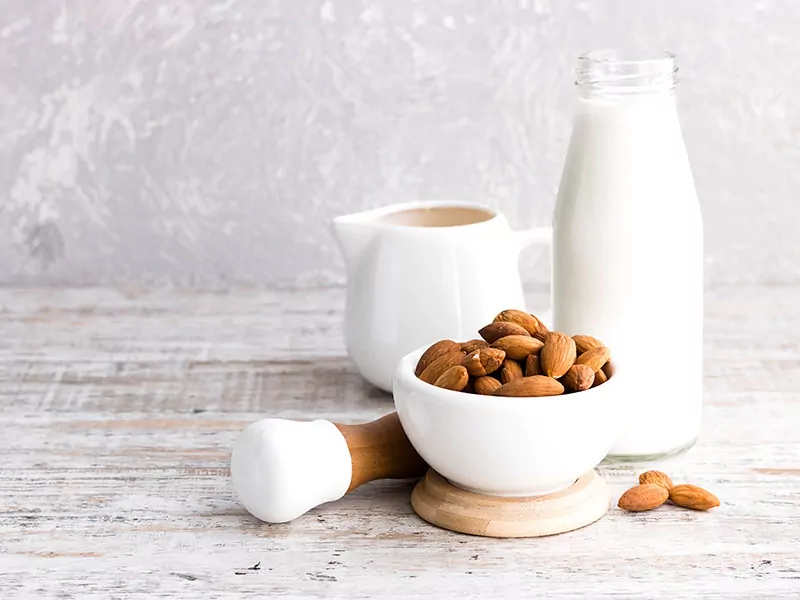
Generally, no matter what cultivar of almond your milk is made from, it is unsafe to store almond milk at room temperature. The only exception to this case is new shelf-stable almond milk, which can last without refrigeration up to 3 weeks after the expiry date.
For unused refrigerated and homemade almond milk, you should always store them in the refrigerator, or else it can go bad within a day.
Can Almond Milk Go Bad?

To cut the long story short, yes, almond milk can go bad. Even if you store the drink in an airtight container inside a frigid refrigerator, it will go bad eventually. There’s hardly anything you can do to keep the milk good forever.
How To Tell If Your Almond Milk Is Spoiled?
Sure, the date on the package may say you still have a few weeks to go, but the pungent smell from the milk might tell a different story. But… but it’s still drinkable, right? Well, how about let’s learn how to tell if your almond milk has gone bad.
1. The Smell
One of the most telltale signs of almond milk going bad is the smell. Once the drink is spoiled, it will lose its nutty and fresh smell.
Take a good sniff at your milk; does it smell sour? Does it smell pungent? Does it smell any different from how almond milk should smell? If the answer is yes, it’s time to throw it away.
2. The Taste
So, let’s say that there’s nothing off about the smell, then you can take a small sip of your milk. If it has a sour or bitter taste, then it means that you should bid farewell to this carton of milk.
3. The Color
Not everyone has the courage to take a sip of potentially spoiled milk, and it’s understandable – I don’t either. That’s why I always observe the drink to see if there’s any discoloration to it. For instance, if the milk has gained a muddy look, then that’s a bad sign.
4. Lumps
If there are a few lumps in your almond milk, you can know for sure that the drink is no longer fresh. However, thawed almond milk (frozen milk taken out of the freezer) might have a few lumps or two. In this case, give the milk a good shake before consuming it.
5. Black Spots
Black spots in food and drinks are usually a no-no sign. Any sensible person would be able to tell that when your food grows strange black spots, you should throw it away, especially if you don’t want to risk a trip to the hospital.
This should be the same for almond milk. When black spots appear, it means that the fungus and mold have contaminated your drink. The contamination might be serious enough that it can cause severe damage to your health if consumed.
6. Unusually Bloated Package
If the package is fine one day and bloated the next, then you can be 99.99% sure that the milk has gone bad. Even if you haven’t opened the carton, an inflated package always means that the drink is no longer consumable. Just throw it in the trash and buy a new one.
Alright, so what if you’re still not certain that your almond milk has gone bad? Let’s have a look at this informative video and learn more!
How Do You Make Almond Milk Last Longer?
Now that you’ve learned that almond milk, unfortunately, can go bad, I believe that you might want some tips on how to make this drink last longer.
Again, in order to determine the best way to store your almond milk, you first need to take into account its type: shelf-stable or refrigerated.
With unopened shelf-stable (unrefrigerated) almond milk, you simply need to store it in a cool and dark area. Whatever you do, remember to keep it away from any sources of heat and sunlight.
This means that places such as pantries or kitchen cabinets are ideal choices for storing unopened shelf-stable almond milk. However, once you open the carton, you should put it in the refrigerator immediately afterward.

If you buy refrigerated almond milk (milk that is sold in the refrigerated section), you will need to store the drink inside the fridge as soon as you get home. Leaving the refrigerated milk at room temperature will risk spoiling it at a staggering speed.

As for homemade almond milk, because the drink does not contain any preservatives, you need to always keep it refrigerated.
For more tips and tricks on how to store homemade almond milk, you can watch this instructional video. You will not be disappointed.
If you’re storing your milk in the refrigerator, the most ideal temperature range is from 38°F (3°C) and around 40°F (4°C). For best results, put the milk on the interior shelf, not the door shelf.
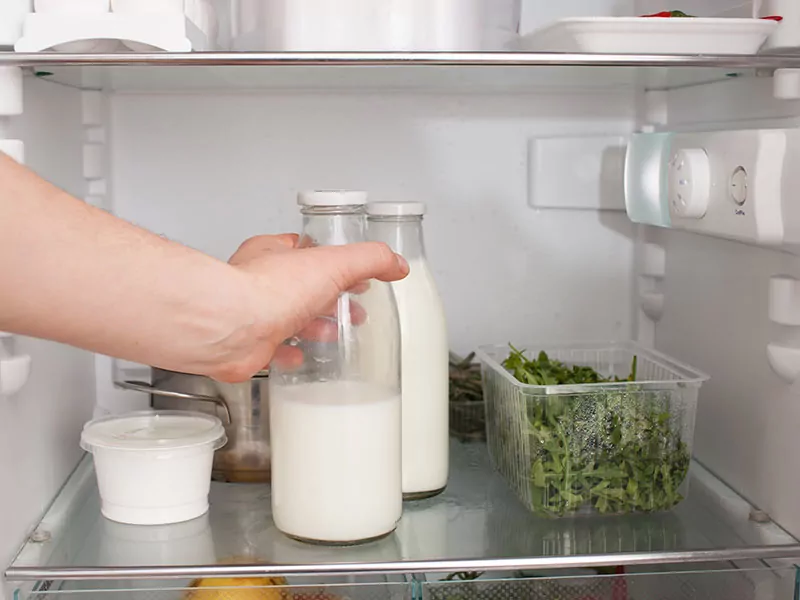
Another important point that I cannot emphasize enough is that you need to tightly seal the milk carton to keep it as airtight as possible. A loosely-capped carton will make your milk go bad much faster than normal.
FAQs
Alright, I’ve covered the main questions regarding whether almond milk can go bad. However, there might be aspects you’re still uncertain about. So, I will go over some common questions you may still have about this amazing drink.
Almond Milk Storage
Even though storing almond milk might seem as simple as ABC, the truth is that you always need to be mindful about the type and lifespan of the drink. Refrigerating or freezing this non-dairy milk might not always be the answer to your problem.
And last but not least, you should always pay attention to the colors, texture, taste, and smell of your almond milk. Even if the drink is still within its expected lifespan, there’s still a chance for it to go bad. Once the milk is spoiled, there’s no way to savage it, so please don’t risk your health by drinking it.
Have I answered all your questions? Is there anything that you’re still uncertain about? Do you need to ask other questions regarding almond milk? If that is the case, feel free to leave a comment in the section below.
Reference
Insight, L., 2019. [HISTORICAL RECORD]: UNSWEETENED ALMOND MILK. [online] U.S. DEPARTMENT OF AGRICULTURE. Available at: <https://fdc.nal.usda.gov/fdc-app.html#/food-details/494261/nutrients>.
